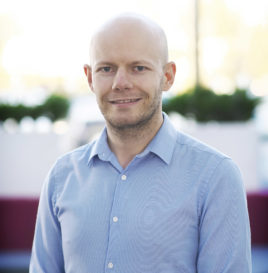
Christopher has 15 years worth of experience in cancer genomics research. He is currently a senior member of Nitzan Rosenfeld’s group at the CRUK Cambridge Institute.
Previously he completed a PhD and first post-doc at the Cardiff University Division of Cancer Genetics, where he studied the genetics and pharmacogenetics of colorectal cancer. During this period he carried out somatic molecular profiling of colorectal tumours with the aim of sensitively identifying and detecting predictive biomarkers that influence response to targeted therapy. He also carried out basic research, exploring germline and somatic mechanisms by which colorectal tumours grow and evolve.
Since joining the Rosenfeld lab he has applied himself to the study of circulating tumour DNA (ctDNA), with the ultimate goal of contributing to the realisation of ctDNA as an effective tool in the clinical care of cancer patients, in particular through earlier detection of disease.
During his time in the Rosenfeld lab, he has had a hand in several research projects, including:
- The establishment and development of robust molecular genetics techniques and work-flows for next generation sequencing based detection of single nucleotide- and somatic copy number- variations in ctDNA.
- The comprehensive characterisation of ctDNA in patients with kidney cancers (Smith et al, Gen Med. 2020). This work highlight this disease as a ctDNA ‘low’ cancer. Nonetheless, through this project he determined the representation of tumour heterogeneity in plasma and urine cell-free DNA, and demonstrated the potential for longitudinal monitoring of disease provided the use of sensitive enough methods.
- The assessment of fragmentation patterns of cell-free DNA in the plasma and urine of patients with a variety of cancer types. A pan cancer exploration of plasma cell-free DNA fragment patterns revealed an enrichment for tumour derived cell-free DNA amongst shorter DNA fragments (Mouliere et al, Sci Trans Med. 2018).
- The application of ultra-sensitive techniques for the detection of low-burden disease as seen in patients with very early stage cancers, or in patients with minimal residual disease after treatment (Wan et al, Sci Trans Med. 2020). These techniques can reliable detect to tumour fractions as low as 10-5 in plasma DNA.
- The exploration of novel populations of cell-free DNA that reside in bodily fluids. In particular, he jointly led a project that identified a previously unobserved population of ultrashort single-stranded DNA fragments in plasma. These fragments, who’s abundance differs between healthy individuals and cancer patients, associate with regulatory elements that govern gene expression.
He now drives a division of the lab devoted to ‘blue skies’ research, which aims to explore and exploit the biological characteristics of ctDNA, improving our analysis methods and ultimately enhancing the clinical utility of liquid biopsy.
References for his research highlights, from his times in Cambridge and Cardiff, are provided:
Key publications
- Smith CG*, Moser T*, Mouliere F, Field-Rayner J, Eldridge M, Riediger AL, Eisen T, Massie CE, Rosenfeld N, Heitzer E, Stewart GD. Comprehensive characterization of cell-free tumor DNA in plasma and urine of patients with renal tumors. Genome Med. 2020 Feb 28;12(1)
- Wan JCM*, Heider K*, Gale D, Murphy S, Fisher E, Mouliere F, McDermott U, Smith CG, Massie C, Corrie PG, Rosenfeld N. ctDNA monitoring using patient-specific sequencing and integration of variant reads. Sci Transl Med. 2020 Jun 17;12(548)
- Heider K, Wan JCM, Hall J, Belic J, Boyle S, Hudecova I, Cooper WN, Corrie PG, Brenton JD, Smith CG, Rosenfeld N. Detection of ctDNA from dried blood spots after DNA size selection. Clin Chem. 2020 May 1;66(5)
- Mouliere F*, Chandrananda D*, Piskorz AM*, Moore EK*, Morris J, Ahlborn LB, Mau-Sørensen M, Parkinson CA, Smith CG, Brenton JD, Rosenfeld N. Enhanced detection of circulating tumor DNA by fragment size analysis. Sci Transl Med. 2018 Nov 7;10(466)
- Mair R*, Mouliere F*, Smith CG, Chandrananda D, Gale D, Marass F, Massie CE, Wright AJ, Watts C, Rosenfeld N, Brindle KM. Measurement of plasma cell-free mitochondrial tumor DNA improves detection of glioblastoma in patient-derived orthotopic xenograft models. Cancer Res. 2019 Jan 1;79(1)
- Mouliere F*, Mair R*, Chandrananda D, Marass F, Smith CG, Su J, Morris J, Watts C, Brindle KM, Rosenfeld N. Detection of cell‐free DNA fragmentation and copy number alterations in cerebrospinal fluid from glioma patients. EMBO Mol Med. 2018 Dec;10(12)
- Patel KM*, van der Vos KE*, Smith CG*, Mouliere F, Tsui D, Morris J, Forshew T, van Rhijn BW, Massie CE, Rosenfeld N, van der Heijden MS. Association Of Plasma And Urinary Mutant DNA With Clinical Outcomes In Muscle Invasive Bladder Cancer. Sci Rep. 2017 Dec 17;7(1)
- Smith CG, Fisher D, Harris R, Maughan TS, Phipps AI, Richman S, Idziaszczyk S, West H, Meade A, Kaplan R, Cheadle JP. Analyses of 7,635 Patients with Colorectal Cancer Using Independent Training and Validation Cohorts Show That rs9929218 in CDH1 Is a Prognostic Marker of Survival. Clin Cancer Res. 2015 Aug 1;21(15)
- Smith CG, West H, Harris R, Idziaszczyk S, Maughan TS, Kaplan R, Steinke V, Propping P, Hes FJ, Wijnen J, Cheadle JP. Role of the Oxidative DNA Damage Repair Gene OGG1 in Colorectal Tumorigenesis. JNCI J Natl Cancer Inst. 2013 Aug 21;105(16)
- Smith CG, Fisher D, Claes B, Maughan TS, Idziaszczyk S, Peuteman G, Adams RA, Kenny S, Kaplan R, Lambrechts D, Cheadle JP. Somatic Profiling of the Epidermal Growth Factor Receptor Pathway in Tumors from Patients with Advanced Colorectal Cancer Treated with Chemotherapy Cetuximab. Clin Cancer Res. 2013 Aug 1;19(15)
- Smith CG, Naven M, Harris R, Colley J, West H, Li N, Nichols L, Kaplan R, Wagner MJ, McLeod HL, Cheadle JP. Exome Resequencing Identifies Potential Tumor-Suppressor Genes that Predispose to Colorectal Cancer. Hum Mutat. 2013 Jul;34(7)
- Maughan TS, Adams RA, Smith CG, Meade AM, Seymour MT, Wilson RH, Kennedy MJ, Claes B, Lambrechts D, Kaplan R, Cheadle JP. Addition of cetuximab to oxaliplatin-based first-line combination chemotherapy for treatment of advanced colorectal cancer: Results of the randomised phase 3 MRC COIN trial. Lancet. 2011 Jun 18;377(9783)
[* indicates joint first author]